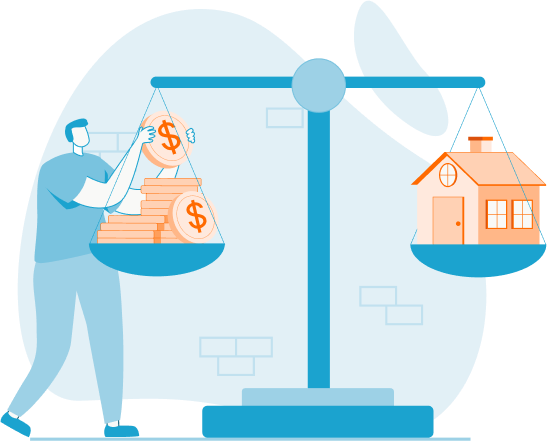Utah Jumbo Refinance


As of February 18, 2026,
- 30 year 5/6 ARM rate jumbo loans in Utah are 5% (% APR).
- 30 year 7/6 ARM rate jumbo loans in Utah are 5.625% (6.191% APR).
- 30 year 10/6 ARM rate jumbo loans in Utah are 5.75% (6.167% APR).
Refinancing Your Jumbo Loan in Utah
Utah jumbo loans allow people to purchase homes that exceed the conforming or super-conforming loan limits for the counties in which they live. If you obtained a jumbo loan to buy your home, it likely allowed you to purchase the property of your dreams. However, you might be thinking about refinancing your jumbo loan to secure a lower interest rate, better loan terms, access your equity, or restructure your mortgage type. Here’s what to know about Utah jumbo loan refinancing from the mortgage experts at City Creek Mortgage.
↓ Try Our Utah Jumbo Mortgage Calculator ↓
Top 4 Reasons People Refinance Their Jumbo Loans
1. Get a Lower Interest Rate
If the mortgage interest rates have significantly dropped since you took out your jumbo loan, it might make sense to refinance to get a lower interest rate. Even if your potential savings might be a fraction of a percentage, you still might be able to save thousands of dollars in interest over the life of your loan by refinancing.
2. Restructure Their Jumbo Loan
If you have a jumbo adjustable-rate mortgage, it might make sense to refinance it if your loan is nearing the end of its fixed-rate period. The payments for jumbo ARM loans can substantially increase or decrease once the initial fixed-rate period is over, and after every adjustment period (commonly every 6 months) which makes it hard to budget. Refinancing a jumbo ARM to a fixed-rate mortgage can help you know exactly what your monthly mortgage payments will be since the interest rate will be the same each month.
By contrast, some people with fixed-rate jumbo mortgages refinance to ARMs. This might be a good idea when people want to enjoy a lower interest rate during the ARM’s initial fixed-rate period and plan to sell their homes before the introductory period’s end. However, people considering this should account for the closing costs of jumbo loans, which can be substantial and might cut into any interest savings they might realize.
3. Change the Length of the Loan Term
Refinancing your jumbo loan might allow you to lengthen or shorten your loan’s term. If you want to reduce the amount of your monthly loan payment, you can lengthen the term of your loan by refinancing your mortgage. However, refinancing into a jumbo loan with a longer term will mean you will spend more money in interest over the life of your loan.
If your income has significantly increased since the time you took out your jumbo loan, you could choose to refinance your mortgage to shorten its term. While this could make your payments go up, it could also allow you to save thousands of dollars in interest by paying off your mortgage quicker.
4. Obtain a Cash-Out Refinance
Cash-out refinance loans are not available to everyone with jumbo mortgages. To obtain a cash-out refinance for a jumbo loan, most lenders will require you to leave between 20% and 30% of the equity in your home. If your equity is between 20% and 30%, you might not be eligible for a cash-out refinance.
However, if you have built up significantly more equity in your home than that, a cash-out refinance could free up some cash to use for other purposes, including paying for your children’s higher education costs, consolidating your debt so that you have a single payment, or completing home renovations or modifications.
If you are considering a cash-out refinance for your jumbo mortgage, you might have to search for a lender who offers jumbo loan cash-out refinance mortgages. The mortgage experts at City Creek Mortgage can help you identify lenders and cash-out refinance options and help you understand whether this might be a good choice for you.
Red Flags That Indicate It’s Not the Right Time to Refinance Your Jumbo Loan
There are several red flags that might indicate you should consider waiting to refinance your jumbo loan, including:
- When prevailing mortgage interest rates are higher than your current rate – If the current market interest rates for jumbo loans are higher than your existing rate, you may want to consider refinancing once the interest rates fall to secure a better rate.
- When you have negative marks on your credit – If you have substantially negative marks on your credit record and a lower credit score, you should work on improving your credit and increasing your score before you apply to refinance your jumbo loan.
- When your cash reserves are low – Since lenders require you to have several months of cash reserves built up to cover loan costs if necessary, you’ll need to wait to apply to refinance until you have built up enough liquidity and sufficient proof of available cash reserve balances.
- You plan to move soon – If you plan to sell your home soon, refinancing your jumbo loan might not make sense because of the closing costs involved. Calculate the closing costs you might expect to pay and their total cost as compared to what you might expect to get when you sell your home to determine whether it makes sense to refinance.
Green Flags That Indicate It’s the Right Time to Refinance Your Jumbo Loan
The following flags might indicate that it’s a good time to consider refinancing your jumbo loan:
- Your credit score is excellent – If you have a high FICO score of 700 or above, you’re likely in good shape for applying for a jumbo refinance loan.
- The current interest rates are lower than the rate on your jumbo loan – If the current interest rates are significantly lower than the rate you have on your current loan, you could save a substantial amount of money by refinancing your jumbo loan.
- You plan to remain in your home – If you plan to remain in your home for a long time, it could make sense to refinance your loan to obtain a lower rate or lower payments.
- You want to pay off your mortgage faster – If you want to pay your mortgage off faster and have enjoyed a significant increase in income since you first obtained your mortgage, it could make sense to refinance your jumbo loan to a shorter term.
- You have a jumbo ARM and are approaching the end of the fixed-rate period – If you have a jumbo ARM and are drawing close to the end of the fixed introductory period, refinancing could make your payments more predictable and avoid high increases in your monthly payments.
Utah Jumbo Loan Refinance (Minimum Requirements)
To refinance your jumbo loan, you will need to find a lender that offers jumbo loan refinancing and meet several minimum requirements as explained below.
1. Credit Score Requirements
You must have good credit to refinance a jumbo loan. The minimum credit score for a jumbo loan refinance mortgage is typically a FICO score of 660, but some lenders might require higher minimum scores.
If you are considering refinancing your jumbo mortgage, you should check your FICO score and pull your credit reports from each of the three major credit reporting bureaus, including TransUnion, Experian, and Equifax.
Carefully review your credit reports, and challenge any inaccuracies. The credit reporting bureaus must verify the information within 30 days of when you challenge it or remove it from our credit reports. If your FICO score is too low, work to increase your score before you apply for a cash-out refinance by taking some of the following actions:
- Set up automatic bill payments to avoid missed payments
- Pay down your credit card balances
- Take care of any collection accounts by negotiating with the creditor and paying them off
- Don’t close old credit accounts
- Avoid applying for new credit
- Pay off credit card balances in full each month if possible
- Create and follow a budget
2. Debt-to-Income (DTI) Requirements
You will need to have a DTI ratio of under 43% to be approved for a jumbo refinance loan. You can calculate your DTI by adding up all of your monthly debt payments and then dividing the total by your gross monthly income. You will then need to convert the decimal to a percentage.
For example, if your total monthly debt payments add up to $5,000, and your monthly gross income is $12,000, this would equal $5,000/12,000 = .4167%, which should be just low enough to meet the minimum DTI requirements.
3. Loan-to-Value (LTV) Ratio Requirements
As previously explained, your LTV ratio must be a maximum of 20% or 30% to qualify for a jumbo refinance mortgage.
4. Property Limitation Requirements
To qualify for a jumbo refinance loan, you must not have more than four mortgaged properties.
5. Bankruptcy History Requirements
You won’t be denied a jumbo refinance mortgage just because of filing for bankruptcy or receiving a discharge in the distant past. However, you likely won’t be eligible if you have a bankruptcy on your credit record within the past seven years.
6. Cash Reserve Requirements
Lenders will want to see that you have several months of cash reserves that can allow you to cover your loan costs. Aim to have 12 months of cash reserves, including liquid accounts and proof of cash on hand.
7. Employment and Income Requirements
You must have verifiable income that is stable and a good employment history to qualify to refinance your jumbo loan.
What Makes Utah Jumbo Refinance Rates & Fees Different?
Jumbo refinance rates are typically higher than the refinance rates for conventional mortgages because of the additional risks faced by the lender. You can anticipate paying from 0.25% to 1% more to refinance your jumbo loan than you might expect to pay to refinance a conventional mortgage.
Fees for jumbo refinance loans also tend to be higher than for standard mortgage refinancing. The closing costs can be significantly higher because of the larger loan amounts.
Lenders that offer jumbo loan refinancing for mortgages exceeding conforming and super-conforming loan limits can’t resell their products to Fannie Mae or Freddie Mac, so they assume the risk of default. Because of this, lenders typically charge higher rates and fees for Utah jumbo refinance loans than for other refinance loans.
Complications of Refinancing a Jumbo Loan in Utah
Since Utah jumbo refinance loans have higher closing costs and undergo manual underwriting, the following complications should be expected:
- High closing costs – You should be prepared to pay from 2% to 6% of the principal balance of your refinance loan upfront when you refinance a jumbo loan. While you can roll these costs into your new loan, this will result in higher payments and a higher interest rate.
- Longer approval process – Many lenders conduct manual underwriting for jumbo refinance loans instead of sending them through an automated process. Manual underwriting takes significantly longer since the underwriters will carefully review your financial information to evaluate the level of risk you might pose if approved.
- More stringent requirements – You must have excellent credit, a low DTI ratio, and substantial cash reserves to qualify to refinance your jumbo loan. If you have marks on your credit, a high debt-to-income ratio, or low cash reserves, you will likely need to wait before applying to refinance your jumbo loan.
Why Are Jumbo Loans Riskier?
Jumbo loans are riskier for lenders than conventional or government-backed mortgages. When a lender extends a jumbo loan, including a jumbo refinance loan, it takes on all of the risks of default.
Unlike conventional mortgages that fall within the conforming loan limits for a given area, jumbo loans exceed them and can’t be resold to Freddie Mac or Fannie Mae. Jumbo loans also do not have any guarantees from federal agencies, so the lender assumes the risk of default when it issues a jumbo loan or jumbo refinance loan. Because of these risks, lenders that offer jumbo loan refinancing typically have much more stringent income, credit, and cash reserve requirements.
Talk to City Creek Mortgage
If you believe refinancing your jumbo loan might make sense for your financial situation, you should speak to a mortgage expert at City Creek Mortgage. We can review everything and help you determine whether it is the right time to refinance or if you should consider waiting and can also explain the costs and fees you might anticipate paying. Call us today to schedule a consultation at (801) 501-7950.




